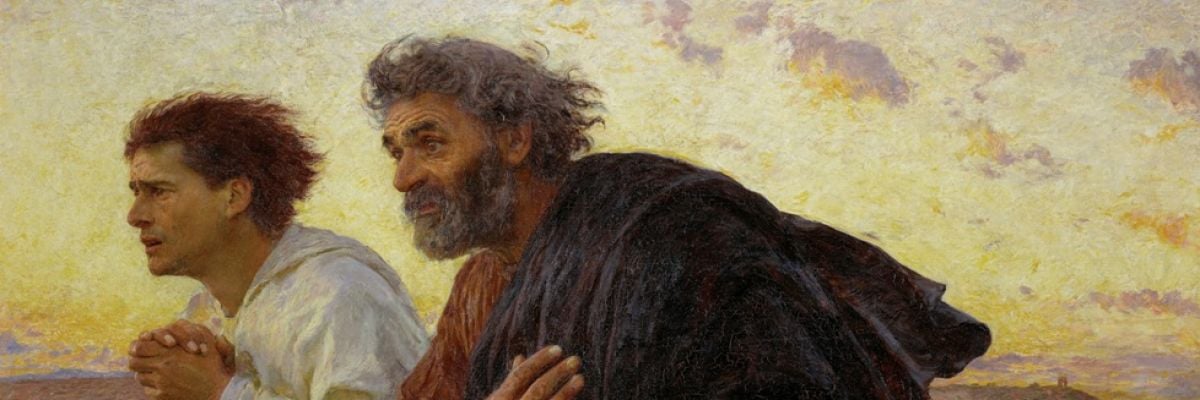
Homily for the Feast of the Resurrection, 2019
On the first day of the week,
Mary of Magdala came to the tomb early in the morning,
while it was still dark,
and saw the stone removed from the tomb.
So she ran and went to Simon Peter
and to the other disciple whom Jesus loved, and told them,
“They have taken the Lord from the tomb,
and we don’t know where they put him.”
So Peter and the other disciple went out and came to the tomb.
They both ran, but the other disciple ran faster than Peter
and arrived at the tomb first;
he bent down and saw the burial cloths there, but did not go in.
When Simon Peter arrived after him,
he went into the tomb and saw the burial cloths there,
and the cloth that had covered his head,
not with the burial cloths but rolled up in a separate place.
Then the other disciple also went in,
the one who had arrived at the tomb first,
and he saw and believed.
For they did not yet understand the scripture
that he had to rise from the dead.John 20:1-9
The mysteries we have been celebrating in the sacred Triduum are great indeed, surpassingly grand and mysterious. They have been the subject of the deepest theology, literature, painting, and music. Everywhere across the globe there are churches where these mysteries are carried out in the sacraments: our death to sin and rising with Christ to a new life in baptism, our share in his very body and blood, our own passing into the eternal life he won for us in the days of our own dying.
And yet the very grandeur of these mysteries can lead us perhaps to overlook a key point in our understanding of them and the nature of our sharing in them during this earthly life. You see, even though the death and resurrection of the incarnate Lord are divine and miraculous events, nonetheless they are events that occur “for us men and for our salvation.” These mysteries are accomplished in a fully human manner because the Savior undertook them for us—not for angels (at least not in the same way) nor for the cosmos (even though the material world has been affected by the work of our redemption).
He is not like a pagan god, seeking worship and admiration, not a superhero or a mythological struggler. These sorts of figures only faintly point the way to the One whose victory over sin and death we celebrate today.
Notice the simple human behavior, the basic human desires, that form the context of today’s feast, which is itself nothing less than the central and determining event of all things. Notice the ardent, individual quality of personal attachment, of the love of friendship, and of delicate and respectful recognition of differences in this affection, proper to each one of the Master’s friends. Yet notice also that “they did not yet understand the scripture that he had to rise from the dead.” This means that they already had begun to witness to this great mystery of the Lord’s rising, indeed they were fully involved in it, and yet it greatness had not yet dawned on them.
What does this mean for our celebration in each other’s company of the Pasch of the Resurrection of the Lord? Arguably, John, Peter, and the Magdalene were the closest to the Savior after his mother. Surely he would have prepared for them an experience of his resurrection, which was just as he willed it to be. It would provide a model for us.
Jesus wants our love, first of all and last of all, and he wants us to love one another as he has loved us, his last and new commandment. Mary and Peter and John truly loved the Lord, and this drew them before dawn, running to him, expecting they knew not what. They would understand, and very soon at that, but he wanted their love for him and each other before he wanted their understanding.
This is not because understanding is inferior to love. It only means that when the One to be known is so great and so far exceeds our capacities, we need a special preparation of the heart in order to understand.
Let us put this logic to work in our celebration of the feast of feast throughout today and the coming week of the Octave of Easter. Let us ask Our Lord through the intercession of the Magdalene, and of St. Peter, and especially of his beloved St John, that we may in all things seek the loving path of holy desires and mutual respect, desiring for those around us all the world of good we seek.
This means, as the apostle teaches, that “all bitterness and wrath and anger and clamor and evil speaking be put away from us” and that we “be kind to one another, tender-hearted, forgiving one another, even as God for Christ’s sake has forgiven us.”
Let our whole goal and focus be the shared love and presence and knowledge of our gloriously Risen Lord!



